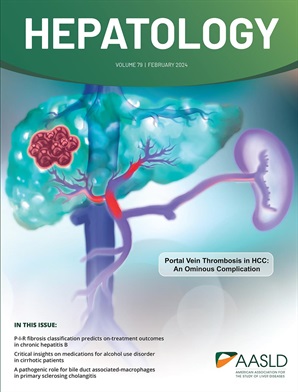成纤维细胞生长因子4抑制erγ - cyp2e1通路可减轻酒精性肝损伤
IF 15.8
1区 医学
Q1 GASTROENTEROLOGY & HEPATOLOGY
引用次数: 0
摘要
背景和目的:酒精性肝病(ALD)是一项严重的全球健康挑战,其特征是过度饮酒导致肝损伤。早期发现和及时干预对于优化患者预后至关重要。然而,酒精性肝损伤的机制尚未完全阐明。成纤维细胞生长因子4 (FGF4)与多种肝脏疾病的进展有关。本研究旨在阐明FGF4在ALD发病机制中的作用。方法和结果:我们分析了人类肝脏标本,观察到ALD患者FGF4 mRNA和蛋白水平显著上调。在接受Lieber-DeCarli液体饮食的小鼠模型中发现了一致的结果。重要的是,在人和小鼠模型中,肝脏FGF4表达与ALD严重程度呈正相关。肝细胞特异性缺失Fgf4 (Fgf4- lko)通过增加氧化应激、炎症和细胞凋亡加剧了酒精诱导的肝损伤。具体来说,Fgf4-LKO小鼠对乙醇加ccl4诱导的纤维化和肝损伤表现出更高的易感性。然而,使用ERRγ逆激动剂GSK5182和CYP2E1抑制剂氯甲基唑(CMZ)治疗可减轻Fgf4缺乏相关的加重肝损伤。机制研究表明,FGFR4磷酸化ERRγ,促进其在肝细胞中的泛素化和降解。肝脏特异性敲除Fgfr4会加剧酒精诱导的肝损伤,并使重组FGF4△NT的保护作用失效。结论:我们的研究确定了FGF4在肝脏病理生理中是一种应激反应调节因子,通过fgfr4介导的erγ - cyp2e1信号通路起作用。这些结果强调了FGF4及其下游通路作为ALD治疗靶点的潜力。本文章由计算机程序翻译,如有差异,请以英文原文为准。
Repression of the ERRγ-CYP2E1 pathway by fibroblast growth factor 4 mitigates alcoholic liver injury
Background and Aims: Alcoholic liver disease (ALD) represents a critical global health challenge characterized by liver damage resulting from excessive alcohol consumption. Early detection and timely intervention are essential for optimizing patient outcomes. However, the mechanisms underlying alcohol-induced liver injury have not been fully elucidated. Fibroblast growth factor 4 (FGF4) has been implicated in the progression of various liver diseases. This study aims to elucidate the role of FGF4 in the pathogenesis of ALD. Approach and Results: We analyzed human liver specimens and observed significant upregulation of FGF4 mRNA and protein levels in patients with ALD. Consistent findings were noted in mouse models subjected to a Lieber-DeCarli liquid diet. Importantly, hepatic FGF4 expression exhibited a positively correlated with ALD severity in both human subjects and murine models. Hepatocyte-specific deletion of Fgf4 (Fgf4 -LKO) exacerbated alcohol-induced liver injury through increased oxidative stress, inflammation, and apoptosis. Specifically, Fgf4 -LKO mice demonstrated heightened susceptibility to ethanol plus CCl4 -induced fibrosis and liver injury. However, treatment with the ERRγ inverse agonist GSK5182 and CYP2E1 inhibitor chlormethiazole (CMZ) mitigated the exacerbated liver injury associated with Fgf4 deficiency. Mechanistic investigations revealed that FGFR4 phosphorylates ERRγ, promoting its ubiquitination and degradation in hepatocytes. Hepatic-specific knockout of Fgfr4 intensified alcohol-induced liver injury and nullified the protective conferred of recombinant FGF4△NT . Conclusions: Our study identifies FGF4 as a stress-responsive regulator in liver pathophysiology, operating via an FGFR4-mediated ERRγ-CYP2E1 signaling pathway. These results underscore the potential of FGF4 and its downstream pathways as therapeutic targets for ALD treatment.
求助全文
通过发布文献求助,成功后即可免费获取论文全文。
去求助
来源期刊

Hepatology
医学-胃肠肝病学
CiteScore
27.50
自引率
3.70%
发文量
609
审稿时长
1 months
期刊介绍:
HEPATOLOGY is recognized as the leading publication in the field of liver disease. It features original, peer-reviewed articles covering various aspects of liver structure, function, and disease. The journal's distinguished Editorial Board carefully selects the best articles each month, focusing on topics including immunology, chronic hepatitis, viral hepatitis, cirrhosis, genetic and metabolic liver diseases, liver cancer, and drug metabolism.
 求助内容:
求助内容: 应助结果提醒方式:
应助结果提醒方式:


